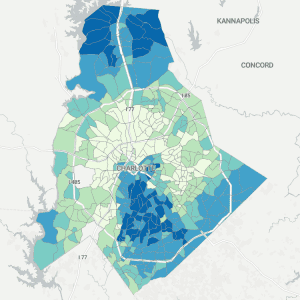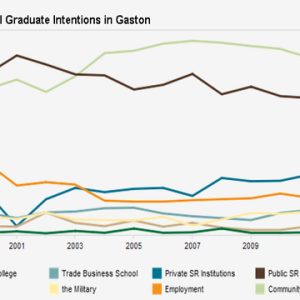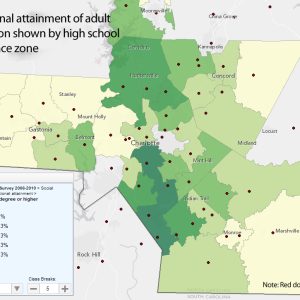Income

Segregation by Design
Charlotte’s neighborhoods (like those of many American cities) are highly segregated by race and economic status. A quick review of the Charlotte/Mecklenburg Quality of Life Explorer’s interactive maps reveals that the data support this claim. The two racial categories with the highest share of the county’s population are White (44.7% of county residents) and Black […]

How jobs contribute to the racial wealth gap
This is the fourth in an ongoing series, based on a report by the Urban Institute. The report was compiled with support from Bank of America, which partners with the UNC Charlotte Urban Institute and the Institute for Social Capital on research that provides insight into community initiatives. Join us Wednesday at 7:30 p.m. on […]
The urban-rural workforce connection
There’s a not-too-surprising insight about how the labor market is changing across the Carolinas Urban-Rural Connection region, which became clearer from real-time commuter data: out-of-county commuting rates are rising. Many more people work in a different county from where they live. While people are traveling farther for well-paying work, leaders charged with workforce and job […]

Historical Overview Part 3: The rise of banking builds a globally connected region
While Duke was building the world’s largest electrical network in the Western Piedmont, some Charlotte mill owners recognized that more money could be made loaning money to aspiring industrialists than making cloth themselves.

In Charlotte housing debate, let’s look at underlying factors
For many decades, the complex and difficult challenges of housing low-income Charlotteans have been the source of local studies, public debate, public policy formation and a variety of actions. This short paper is intended to trace the evolution of the challenges in Charlotte and the responses to them, with an eye toward the future for […]

Addressing the opportunity gap for Charlotte’s children
Is the promise of the American Dream a reality only for the richest children? The latest book from Harvard’s Robert D. Putnam, Our Kids: The American Dream in Crisis, investigates that question. Putnam, the Peter and Isabel Malkin Professor of Public Policy at Harvard’s John F. Kennedy School of Government, will appear Monday in Charlotte, […]

Has Charlotte metro income really declined?
Recently the site FiveThirtyEight.com reported that of the largest U.S. metros, only Charlotte’s median income, “experienced a statistically significant decline” in 2013. What’s going on? That statement may signal to the casual reader that wages are sinking in the Charlotte region. In reality, however, that “statistically significant decline” appears to be the result of a […]

Gaston agencies, foundation work with institute to create new online resource
A new data resource about Gaston County is available through online, interactive dashboards. Trends on the county’s demographics, economy, education, health and quality of life are tracked and compared to peer counties as well as state and national figures. This represents a continuing partnership coordinated by Gaston Together and other local Gaston County groups with […]

N.C.’s TIMS project helps effort to update public school boundaries
Where your child (or grandchild or niece) goes to school is important to you personally. How the demographics of your child’s district compare to that of other districts across the country is important to researchers, policy makers and even disaster relief planners. A program used in North Carolina should streamline the work of updating this […]

Recession in Charlotte, Sun Belt: more people, more poverty
Population growth in Charlotte has always come with plenty of costs, but rising incomes and prosperity were part of the expected returns. Yet it turns out that during the recent recession and economic downturn, as population growth continued, economic growth sputtered. Charlotte experienced a long period of population and income growth through much of the […]